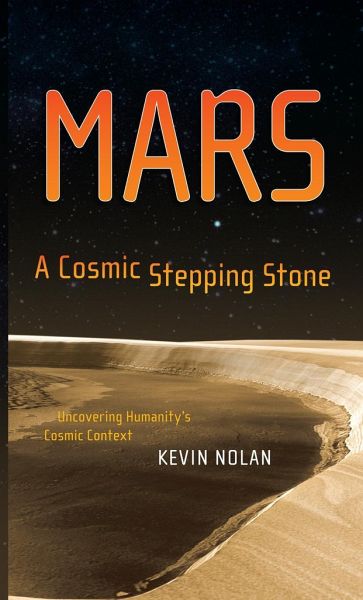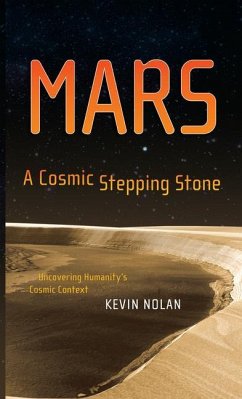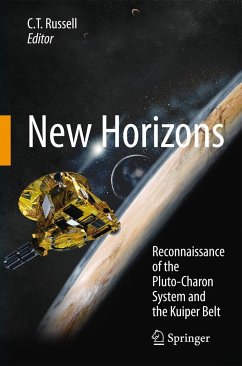
Mars, a Cosmic Stepping Stone
Uncovering Humanity's Cosmic Context
Versandkostenfrei!
Versandfertig in 6-10 Tagen
20,99 €
inkl. MwSt.
Weitere Ausgaben:

PAYBACK Punkte
10 °P sammeln!
The questions of our origin and cosmic abundance of life are among the most compelling facing humanity. We have determined much about the nature and origin of the Universe and our place in it, but with virtually all evidence of our origin long since gone from our world and an unimaginably vast Universe still to explore, defining answers are difficult to obtain.For all of the difficulties facing us however, the planet Mars may act as a 'cosmic stepping stone' in uncovering some of the answers. Although different today, the origin and early history of both Earth and Mars may have been similar en...
The questions of our origin and cosmic abundance of life are among the most compelling facing humanity. We have determined much about the nature and origin of the Universe and our place in it, but with virtually all evidence of our origin long since gone from our world and an unimaginably vast Universe still to explore, defining answers are difficult to obtain.
For all of the difficulties facing us however, the planet Mars may act as a 'cosmic stepping stone' in uncovering some of the answers. Although different today, the origin and early history of both Earth and Mars may have been similar enough to consider an origin to life on both. But because Mars' planetary processes collapsed over three billion years ago - just as life was beginning to flourish on Earth - a significant and unique record of activity from that era perhaps relevant to the origin of life still resides there today.
In recognition of this, both the US and Europe are currently engaged in one of the most ambitious programs of exploration ever undertaken. Built on our legacy of Mars exploration from the Viking era and before, a far-reaching, phased, program of robotic exploration now and over the coming decades aims at obtaining definitive answers about the origin and nature of the red planet and what it has to say about the origin and cosmic abundance of life. This book examines these issues in one of the most comprehensive treatments ever written about the planet Mars and our legacy of engagement with it, in language suitable for non-expert and expert alike.
Opening chapters consider the question of life in the Universe and the origin of life on Earth and what challenges face us in uncovering defining answers. With a realization of its importance in this, the next section examines the legacy of our engagement with Mars. From Kepler's work on its orbit, Schiaparelli's efforts to resolve its surface features and NASA's Mariner andViking programs attempting to determine whether life resides upon the surface, Mars has remained elusive, yet always prodding and extending our capabilities in exploration and our perception of our place in the Universe. Subsequent chapters consider our current understanding of the planet and the recently devised comprehensive program for scientific exploration. All recent, current and upcoming missions and the latest findings are discussed in detail, providing our best understanding yet of a vast and ancient landscape indeed characterized by significant activity relevant to our quest and which also points to a planet far from dead today. Late chapters consider NASA and ESA plans for Mars over the next thirty years, increasingly shaped by the scientific successes to date, unprecedented public interest and by issues of planetary protection. And with mounting political interest, our program for Mars may culminate in a human mission to Mars, perhaps sometime around 2040. The greatest discovery, however, remains to be made. If even one microbe is found on Mars, it will reveal a cosmic context for life with Earth as one place among many harboring life, confirming our cosmic origins and destiny.
For all of the difficulties facing us however, the planet Mars may act as a 'cosmic stepping stone' in uncovering some of the answers. Although different today, the origin and early history of both Earth and Mars may have been similar enough to consider an origin to life on both. But because Mars' planetary processes collapsed over three billion years ago - just as life was beginning to flourish on Earth - a significant and unique record of activity from that era perhaps relevant to the origin of life still resides there today.
In recognition of this, both the US and Europe are currently engaged in one of the most ambitious programs of exploration ever undertaken. Built on our legacy of Mars exploration from the Viking era and before, a far-reaching, phased, program of robotic exploration now and over the coming decades aims at obtaining definitive answers about the origin and nature of the red planet and what it has to say about the origin and cosmic abundance of life. This book examines these issues in one of the most comprehensive treatments ever written about the planet Mars and our legacy of engagement with it, in language suitable for non-expert and expert alike.
Opening chapters consider the question of life in the Universe and the origin of life on Earth and what challenges face us in uncovering defining answers. With a realization of its importance in this, the next section examines the legacy of our engagement with Mars. From Kepler's work on its orbit, Schiaparelli's efforts to resolve its surface features and NASA's Mariner andViking programs attempting to determine whether life resides upon the surface, Mars has remained elusive, yet always prodding and extending our capabilities in exploration and our perception of our place in the Universe. Subsequent chapters consider our current understanding of the planet and the recently devised comprehensive program for scientific exploration. All recent, current and upcoming missions and the latest findings are discussed in detail, providing our best understanding yet of a vast and ancient landscape indeed characterized by significant activity relevant to our quest and which also points to a planet far from dead today. Late chapters consider NASA and ESA plans for Mars over the next thirty years, increasingly shaped by the scientific successes to date, unprecedented public interest and by issues of planetary protection. And with mounting political interest, our program for Mars may culminate in a human mission to Mars, perhaps sometime around 2040. The greatest discovery, however, remains to be made. If even one microbe is found on Mars, it will reveal a cosmic context for life with Earth as one place among many harboring life, confirming our cosmic origins and destiny.













